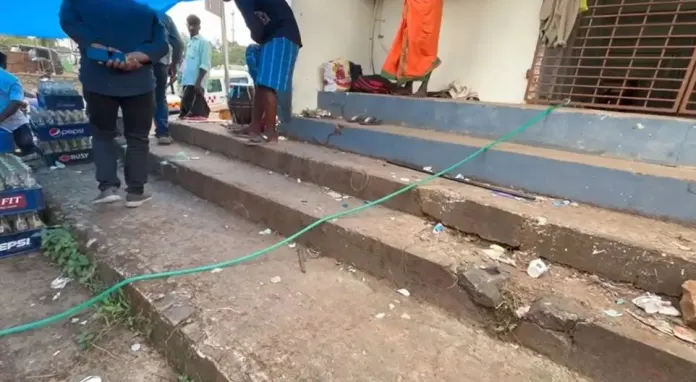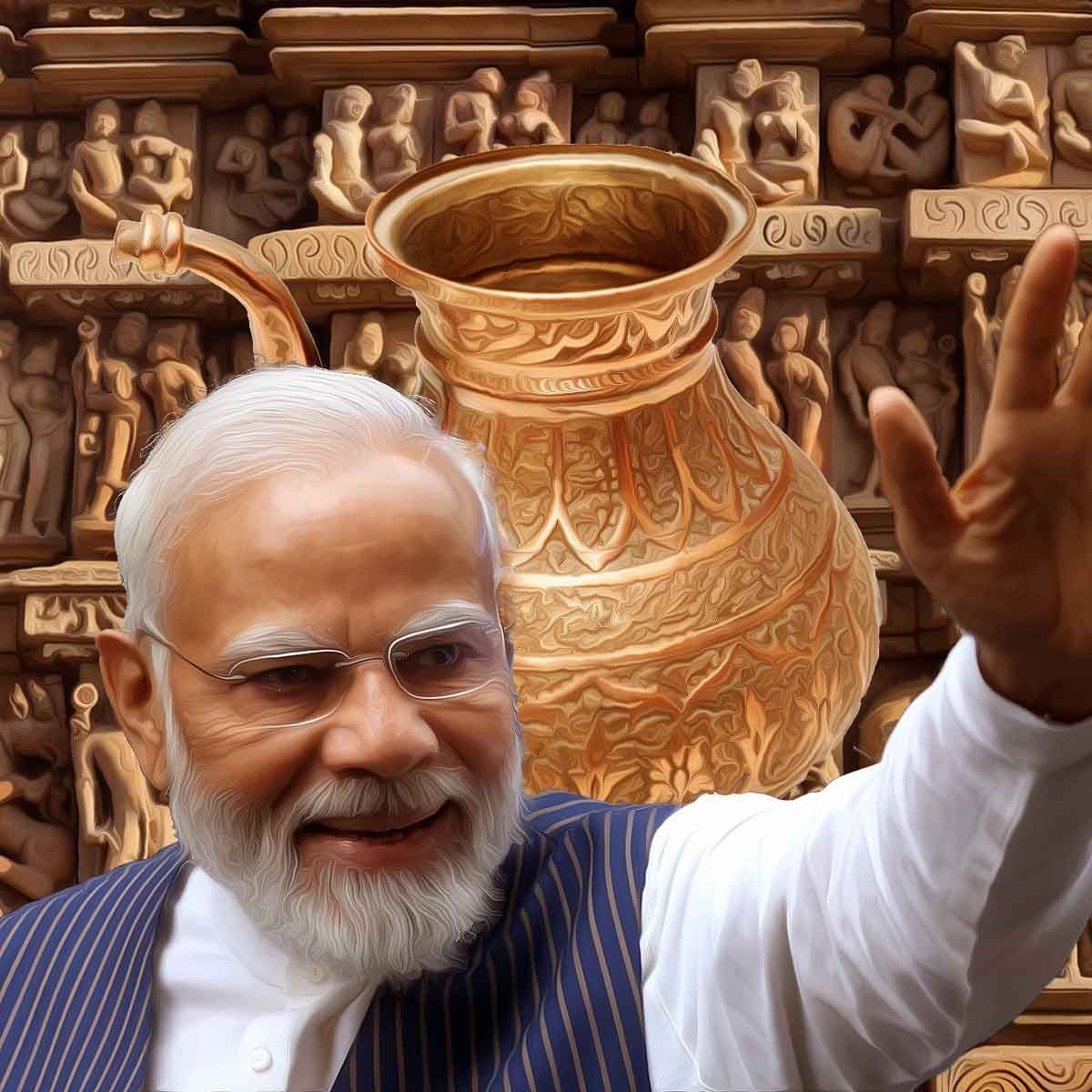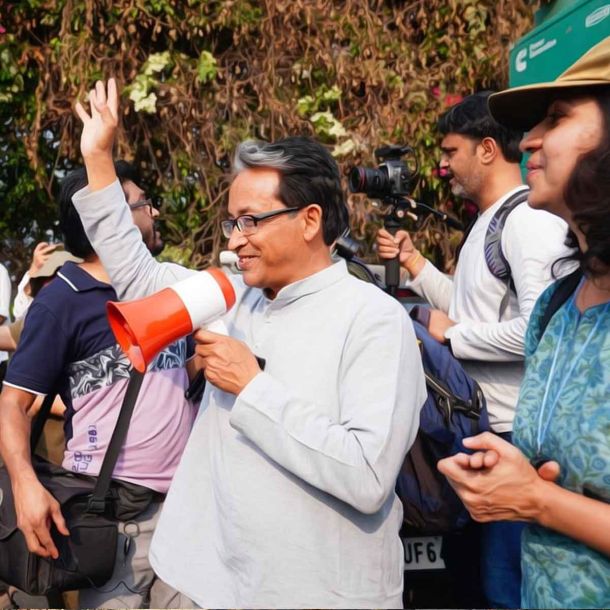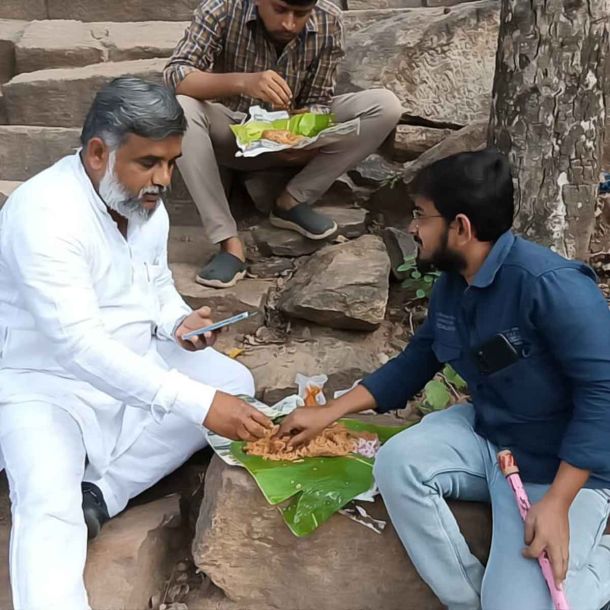MORE COVERAGE
Twitter Coverage
Satyaagrah
Written on
Satyaagrah
Written on
Satyaagrah
Written on
Satyaagrah
Written on
Satyaagrah
Written on
JOIN SATYAAGRAH SOCIAL MEDIA
"Food Jihad, Mashallah": CPIM youth wing leader Abdul Shemim caught using toilet water for cooking for Lord Ayyappa devotees for approximately two weeks, this is a peak season of Sabarimala pilgrimage called mandala, grabbed by Ayyappa Seva Sangh

In the tranquil town of Erumeli, Kottayam, Kerala, a shocking incident unfolded, threatening the sanctity of Sabarimala pilgrims. Erumeli, a significant stop on the pilgrimage route to Sabarimala, witnessed a disturbing event involving Abdul Shemim, a leader associated with the CPIM youth wing. For the past 13 days, Shemim, who owns a hotel, allegedly engaged in an appalling act by preparing food for Sabarimala pilgrims using water sourced from the toilet. The gravity of this accusation has raised concerns and drawn attention from the Ayyappa Seva Sangh, an organization dedicated to the well-being of Sabarimala pilgrims.
This awful action by the hotel was found during an inspection by the Ayyappa Seva Sangh. Abdul Shehim is the DYFI Erumeli Regional Secretary. Currently, the authorities issued stop memo to the hotel.
The reprehensible act of using toilet water for cooking came to light when the Ayyappa Seva Sangh conducted an inspection of the hotel. Abdul Shehim, identified as the DYFI Erumeli Regional Secretary, is allegedly involved in this disturbing incident. In response to the severity of the situation, authorities have issued a stop memo to the hotel, halting its operations.
I have a small request for my Hindu brothers who are going to Sabarimala from Karnataka, Andhra Pradesh, Telangana, and even Tamilnadu. Please try to avoid eating hotel food as much as you can and try cooking your own food.
In light of these disconcerting revelations, a plea is made to Hindu pilgrims traveling to Sabarimala from various states, including Karnataka, Andhra Pradesh, Telangana, and Tamil Nadu. The request emphasizes the importance of avoiding hotel food due to potential risks. Pilgrims are urged to take precautions by cooking their own meals, ensuring their safety and well-being during the sacred journey.
Alternatively, all over Kerala, the Ayyappa Seva Sangh provides food facilities at rest centers, so please make use of them.
Recognizing the need for a safer alternative, pilgrims are advised to utilize the food facilities provided by the Ayyappa Seva Sangh at rest centers across Kerala. This alternative ensures that pilgrims can partake in nourishing meals without compromising their health and religious journey.
The hotel industry in Kerala is largely influenced by individuals belonging to a particular religious group. For them, you’re KAFIR !!
The statement highlights a concerning aspect of the hotel industry in Kerala, pointing out a significant influence by individuals from a particular religious group. The use of the term "KAFIR" suggests a discriminatory attitude towards those outside this religious affiliation, raising questions about fair and unbiased practices within the industry. This revelation adds a layer of complexity to the case, bringing attention to potential religious biases.
A food stall managed by a man named Abdul Shemim at Erumeli has been accused of serving food cooked in toilet water to Sabarimala pilgrims during the peak season of pilgrimage.
Specific details emerge as Abdul Shemim, identified as the manager of a food stall in Erumeli, faces accusations of serving food cooked with toilet water to Sabarimala pilgrims. This alleged misconduct occurred during the peak season of the pilgrimage, amplifying the severity of the situation. The use of unsanitary water for food preparation poses significant health risks to the pilgrims, and the accusations raise concerns about the ethical standards within the hospitality establishment.
|
Notably, Erumeli lies along the routes leading to the revered Sabarimala temple in Kerala.
The geographical context is crucial to understanding the significance of the incident. Erumeli's location along the routes to the Sabarimala temple makes it a crucial stop for pilgrims. The proximity to this revered temple intensifies the impact of the accusations, as any compromise on hygiene and food safety directly affects the spiritual journey of Sabarimala pilgrims. The sacredness of the pilgrimage demands a higher standard of integrity from those involved in providing essential services to the devotees.
During inspection, it was found that the shop was using a hose from the adjacent toilet for water supply to make tea and lime juice.
The inspection reveals a shocking breach of hygiene standards, as the shop in question was discovered using a hose connected to an adjacent toilet for water supply in the preparation of tea and lime juice. This unhygienic practice poses a severe risk to the health of consumers, especially considering the consumption of these beverages. The incident underscores a blatant disregard for sanitary regulations, prompting immediate action to address the concerning situation.
According to Republic TV, visuals of the incident showed that a blue-coloured hose was found connecting both the adjacent bathroom and the shop selling the liquids.
Visual evidence strengthens the case against the accused establishment, with Republic TV reporting the presence of a blue-colored hose linking the adjacent bathroom and the shop selling beverages. The visual representation adds a layer of credibility to the allegations, providing a clear demonstration of the unhygienic connection between the toilet and the area where consumables are prepared and sold. This reinforces the gravity of the situation and the need for swift intervention.
The pipe was coming out from the grill of the toilet and it extended up to the shop.
A detailed description of the hose's origin and extension is provided, emphasizing that the pipe came out from the grill of the toilet and extended all the way to the shop. This vivid imagery paints a picture of the unsanitary conditions under which food and beverages were being prepared. The physical connection between the toilet and the shop highlights the severity of the violation and the urgent need to address public health concerns.
Initially, the shop owner claimed that the toilet water was used only for dishwashing and not for cooking purposes.
The initial response from the shop owner attempts to downplay the severity of the situation by claiming that the toilet water was solely used for dishwashing and not in the cooking process. This defense, however, is called into question by the evidence uncovered during the inspection. The conflicting statements create an atmosphere of mistrust, necessitating a thorough investigation to ascertain the truth behind the alleged unsanitary practices.
"However, recorded evidence showed otherwise. Subsequently, the Revenue Vigilance Squad and the Health Department registered a case against the accused Abdul Shehim."
The discrepancy between the shop owner's claim and the recorded evidence becomes evident, leading to the initiation of legal proceedings. The Revenue Vigilance Squad and the Health Department take decisive action by registering a case against Abdul Shehim, the accused individual. This step is crucial in holding the responsible party accountable for jeopardizing public health and safety. The involvement of multiple authorities reflects the gravity of the offense and the commitment to addressing the issue comprehensively.
The unsanitary practice was caught by Ayyappa Seva Sangh when it was conducting an inspection.
The discovery of the unsanitary practice unfolded during an inspection carried out by Ayyappa Seva Sangh. This emphasizes the importance of routine checks and vigilance in maintaining hygiene standards, especially in establishments catering to the public. The proactive role of Ayyappa Seva Sangh in conducting inspections showcases their commitment to ensuring the well-being of consumers, particularly during peak pilgrimage seasons when the influx of devotees is higher.
The suspicion initially aroused about the eatery’s unhygienic practices when a foul smell started permeating the vicinity.
The initial suspicion surrounding the eatery's unhygienic practices emerged due to the onset of a foul smell that permeated the vicinity. The foul odor acted as a red flag, prompting concerns about the establishment's adherence to hygiene standards. The olfactory indicator underscores the significance of sensory cues in identifying potential health hazards, prompting further investigation to ascertain the source of the unpleasant smell.
 |
| (Image Source – Republic) |
Through inspection, the Ayyappa Seva Sangh revealed that the food stall was being managed by Abdul Shehim who also serves as the area secretary of the Democratic Youth Federation of India (DYFI), the youth wing of CPIM.
The inspection conducted by Ayyappa Seva Sangh unveiled crucial details about the management of the food stall. Abdul Shehim, identified as the individual overseeing the eatery, holds the additional role of serving as the area secretary of the Democratic Youth Federation of India (DYFI), the youth wing of CPIM. This revelation adds a layer of complexity to the situation, linking the accused to a political youth organization, which may have implications on the broader narrative.
It was also revealed that the accused had been using toilet water for cooking for Lord Ayyappa devotees for approximately two weeks.
The inspection brought to light a disturbing revelation: the accused, Abdul Shehim, had been employing unsanitary practices by using toilet water for cooking meals served to Lord Ayyappa devotees. The specific timeframe of approximately two weeks highlights the duration during which this unhygienic practice persisted, underscoring the urgency of addressing the issue to prevent further health risks to devotees and the public at large.
Subsequently, a combined inspection was conducted by the Revenue and Health department, and a stop memo was issued to the shop.
Following the initial discovery by Ayyappa Seva Sangh, a coordinated effort was made with a joint inspection conducted by the Revenue and Health departments. In response to the findings, a decisive action was taken, and a stop memo was issued to the shop. This proactive approach underscores the swift response of the authorities in addressing the situation and ensuring immediate measures to halt the unsanitary practices, safeguarding the health of the pilgrims and the public.
According to Erumeli Revenue Special Squad Charge Officer Deputy Tehsildar Biju G Nair, the investigation is ongoing, and further inspections have been planned in the coming days.
Deputy Tehsildar Biju G Nair, the Erumeli Revenue Special Squad Charge Officer, provided insights into the ongoing investigation. The commitment to thorough scrutiny is evident, with plans for additional inspections in the coming days. This signifies a sustained effort to delve deeper into the matter, ensuring a comprehensive understanding of the circumstances and potential areas of accountability. The continuation of investigations reflects a dedication to uncovering the truth and holding responsible parties accountable.
He emphasized that accountability goes beyond the food stall owner and claimed that action will also be taken against the contractor who was responsible for allowing the hose connection from the toilet tap.
Deputy Tehsildar Biju G Nair emphasized a broad perspective on accountability, indicating that it extends beyond the food stall owner. Notably, attention is directed towards the contractor responsible for allowing the unhygienic hose connection from the toilet tap. This approach underscores the commitment to addressing the issue at its roots and ensuring that all parties involved in facilitating the unsanitary practice are held accountable, promoting a thorough and just resolution to the matter.
As per a Manorama Online report, an alert team from the revenue department apprehended a food stall vendor in the act of connecting a hose from the toilet pipe to obtain water for preparing food for Sabarimala pilgrims.
A Manorama Online report provides additional details, highlighting the vigilance of an alert team from the revenue department. The apprehension of the food stall vendor in the act of connecting a hose from the toilet pipe underscores the real-time intervention by authorities. This immediate action prevented the continuation of the unsanitary practice, demonstrating the significance of active surveillance and the commitment to ensuring the well-being of Sabarimala pilgrims.
The health department swiftly intervened, shutting down the temporary shop, and initiating legal actions against the license holder.
The health department played a pivotal role by swiftly intervening, leading to the closure of the temporary shop. This rapid response reflects a commitment to public health and safety, as well as a determination to curtail any potential health risks associated with the unsanitary cooking practices. Initiating legal actions against the license holder underscores a commitment to accountability and upholding the standards of hygiene and food safety in establishments catering to the public.
The shop was reportedly granted a temporary license to sell non-edible items; however, it was flouting that rule as well. The revelation that the shop was granted a temporary license to sell non-edible items adds another layer to the unfolding situation. The violation of this rule indicates a disregard for regulatory norms and raises questions about the adherence to licensing requirements. This aspect underscores the importance of ensuring that establishments adhere to the stipulated rules and regulations, not only in terms of food safety but also in obtaining the appropriate licenses for their operations.
Republic TV reported that after repeated calls to the police, the officials maintained that no case had been filed.
Republic TV's report highlights a concerning aspect of the response to the situation. Despite repeated calls to the police, officials maintained that no case had been filed. This raises questions about the efficacy and timeliness of the response from law enforcement. The absence of immediate legal action could be a point of contention, especially considering the severity of the alleged malpractice. It prompts a critical examination of the coordination between concerned authorities and the urgency with which they address such matters.
The report added that it didn’t lodge a case despite the fact that the police team was physically present at the site. The report's assertion that no case was lodged, even with the physical presence of the police team at the site, adds a layer of complexity to the situation. The discrepancy between the physical presence of law enforcement and the absence of a filed case raises questions about the decision-making process and the factors influencing the handling of the incident. This aspect warrants further scrutiny to understand the dynamics at play during this critical phase of intervention.
The BJP local unit alleged that CPIM and Congress were trying to protect the shop owner and not filing a case. Allegations from the BJP local unit bring a political dimension to the situation, suggesting that there may be attempts to shield the shop owner from legal repercussions. Accusations of political interference in not filing a case raise concerns about impartiality and the fair application of the law. This political aspect adds a layer of complexity to the incident, potentially influencing public perceptions and contributing to a broader discourse on accountability and transparency in addressing such matters.
It is important to note that the incident occurred during the peak season for the Sabarimala temple.
The timing of the incident during the peak season for the Sabarimala temple adds a significant dimension to the overall impact. The Sabarimala pilgrimage is a crucial religious event, attracting a large number of devotees. The alleged malpractice, occurring at a time when pilgrims are flocking to the temple, amplifies the potential consequences. It not only jeopardizes the well-being of devotees but also raises questions about the preparedness and oversight in ensuring a safe and hygienic environment during this crucial period.
The 41-day pilgrimage which is known as the mandala (season), scheduled for December and January is all set to begin.
The mention of the upcoming 41-day pilgrimage, known as the mandala season, scheduled for December and January, underscores the urgency of addressing the situation promptly. With the pilgrimage about to commence, there is a heightened need for swift and effective intervention to ensure the safety and well-being of the devotees. The impending religious event adds a sense of urgency and underscores the significance of resolving the matter before it potentially impacts the pilgrimage experience for the countless devotees participating in this sacred tradition.
 Support Us
Support Us
Satyagraha was born from the heart of our land, with an undying aim to unveil the true essence of Bharat. It seeks to illuminate the hidden tales of our valiant freedom fighters and the rich chronicles that haven't yet sung their complete melody in the mainstream.
While platforms like NDTV and 'The Wire' effortlessly garner funds under the banner of safeguarding democracy, we at Satyagraha walk a different path. Our strength and resonance come from you. In this journey to weave a stronger Bharat, every little contribution amplifies our voice. Let's come together, contribute as you can, and champion the true spirit of our nation.
 |  |  |
| ICICI Bank of Satyaagrah | Razorpay Bank of Satyaagrah | PayPal Bank of Satyaagrah - For International Payments |
If all above doesn't work, then try the LINK below:
Please share the article on other platforms
DISCLAIMER: The author is solely responsible for the views expressed in this article. The author carries the responsibility for citing and/or licensing of images utilized within the text. The website also frequently uses non-commercial images for representational purposes only in line with the article. We are not responsible for the authenticity of such images. If some images have a copyright issue, we request the person/entity to contact us at satyaagrahindia@gmail.com and we will take the necessary actions to resolve the issue.
Related Articles
- Elderly woman gang-raped in front of grandson, minor Dalit girl gang-raped and left to die in jungle: WB horror stories emerge
- Supreme Court dismisses plea seeking protection of Hindus from the Muslim community in Mewat
- Pro-Pakistani and a Pro-Khalistani Canadian MP Jagmeet Singh is busy whitewashing anti-Hindu attacks committed by Muslim mobs during Ram Navami procession: Urges Canada to intervene to restore Human Rights
- "मेरा मुल्क, मेरा देश, मेरा ये वतन": In Tanti Bazar, Bangladesh, Mohammed Hridoy, and Mohammed Jibon attacked a Durga Puja mandap with a petrol bomb, stabbing devotees when stopped, as Bijoy Shah clarified the attack and robbery were separate incidents
- The Character of Muslim Rule in India - The Story of Islamic Imperialism in India
- Telegram channel using images of Hindu women for harassment and abuse is blocked: IT Minister Ashwini Vaishnaw orders action against Channel, Mumbai Police keeps mum
- Calcutta Quran Petition: A petition to ban the Quran altogether was filed 36 years ago, even before Waseem Rizvi petitioned for removing 26 verses from Quran
- The Residue of Islamism - Hindu Society Under Siege
- In the latest development in Kishan Bharwad murder case, Ahmedabad police have arrested two suspects, Hindu organizations have called for a bandh protesting against the murder
- Embedded Hindumisia attitude of IndiaSpend is exposed further due to their faulty 'Hate Tracker' trying to show they are 'Neutral'
- Tablighi Jamaat is called out as a gate to terrorism by Saudi Arabia, warns people against affiliation to the already banned group
- Prachi Rana, a 15-year-old girl killed in her house at Pratap Nagar in Amb for resisting molestation by Newspaper hawker Asif Mohammad: Accused arrested for silting throat, police urge people not to give it ‘communal’ colour
- Jihad Recruitment going on in Madrassas forced the Assam government to cease hundreds of them
- Haunting history- 50 years of Operation Searchlight in Dhaka
- Girl students wear saffron shawls, chant Jai Shri Ram to protest against hijab in Karnataka: What Ambedkar meant about Women in Islamic Veil by saying, ‘One of the most hideous sights one can witness in India’



























